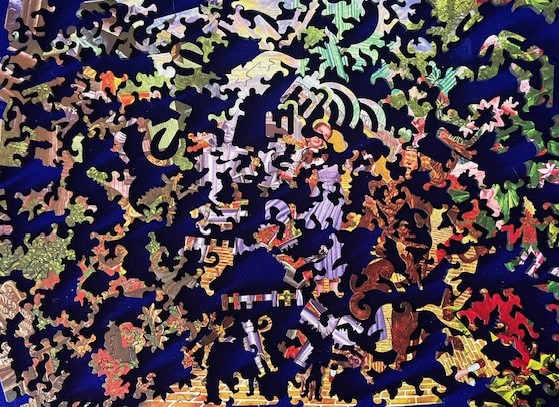
From the perspective of whitewater navigation, this would mean that Dorothy (and all of us) must experiment with different ways of engaging our kayak in our current whitewater world. We particularly try out some changes that might make sense in terms of how the river is likely to operate around the next bend. Will there be more rocks, greater drop in elevation, more bends, etc.? We take “notes” on how our kayak is behaving in response to changes in our use of the paddle, our way of sitting in the kayak, etc.
Scharmer requires that we not only try out several ways of kayaking, and take notes on these trials, but also explore and embrace new ways of thinking about the kayak and the dynamic way it operates in the river’s turbulence. These new ways are activated by what we have learned from the current trials. The new ways, in turn, influence other changes we might wish to try out before reaching the next bend in the river. Effective learning, in other words, becomes recursive and directed toward (leaning toward) the future.
None of this learning is easy. Furthermore, it is hard to determine which changes to make and how best to reflect on these changes. We must be patient in reviewing what Dorothy is doing and has doing as someone trying to transform and improve her way of being in the world. We must similarly be patient and understanding of the tentatively changes being made by her Oz companions. These processes are particularly challenging to engage when we are still navigating the current white-water world.
An expert on white water navigation might join us in the kayak (without tipping it over!). They can help us manage the real-time interplay between centering and forethought. It takes a particularly skillful coach or consultant who is herself both centered and forethinking if she is to be of benefit in the management of this dynamic, turbulent polarity. The request should read: “Coach or consultant is needed who is willing to travel—on a white-water river—and is willing to learn in real time alongside their client. A proclivity toward leaning into the future is prerequisite.”
Contradiction
Contradictions exist when we are presented with two or more perspectives or sets of practices that are of equal validity and are equally useful. However, these perspectives and practices differ in significant ways from one another and are not readily reconciled. The liberal warriors are caught up in the middle of this world of contradictions. On the one hand, they wish to be open-minded and respectful of all opinions (even those held by the opposition). Journalism is supposed to be balanced and “fair-minded.” All views must be reported, however distorted and manipulative. The liberal warriors are committed to a relativistic perspective—seeking to understand, appreciate, and find “the good” in all viewpoints.
At the same time, they are labeled warriors by Vandehei for good reason and it is not about finding the “good” in all viewpoints. As identified by William Perry (1970), these warriors have moved beyond a relativistic perspective, to what Perry calls “commitment in relativism.” There should be no tolerance for distorted facts. Yes, there can be alternative opinions—but not alternative facts or alternative realities. Liberal warriors can’t spend their time seeking to appreciate the intentions of those seeking to tear down democracy or block the river of progress into the future.





